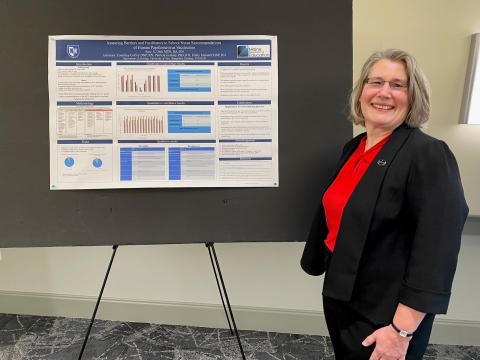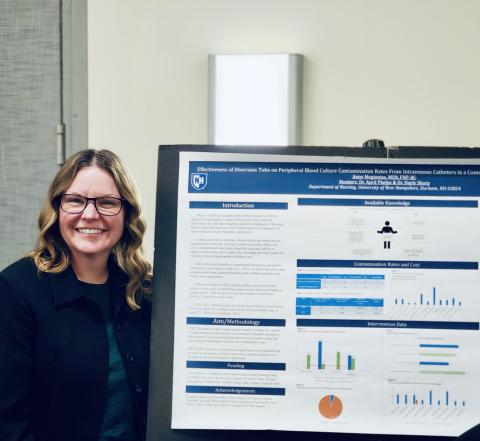Advancing Healthcare: DNP Graduates Make an Impact with Quality Improvement Projects
UNH’s Doctor of Nursing Practice (DNP) prepares mid-career nurses to advance to the highest level of nursing practice. DNP preparation includes leadership, clinical and management skills, and an emphasis on transforming healthcare delivery and practice for quality and safety.
Each year the members of the graduating class undertake quality improvement projects that build upon students' professional backgrounds with research to address challenges in healthcare. There were 19 projects presented at the 2024 DNP symposium. Here are three examples of projects that are already making a difference:

Amy Dark
Professional Background: Dark has over 16 years of experience as a practicing school nurse at all grade levels, primarily grades K-5. Additionally, she is a certified grade K-12 health educator, teaching health education virtually to kindergarten, first, and second-grade students during the pandemic.
DNP Goal: Dark wanted to expand her ability to advocate for school nurses and improve health equity and outcomes in the school setting.
What’s Next?: Dark works as a nursing education and practice specialist for the National Association of School Nurses, where she develops education programs on various topics, including vaccine confidence and chronic disease management.
Quality Improvement Project: Strengthening School Nurses’ Role in HPV Vaccine Advocacy
The HPV vaccine prevents several types of cancer but remains underutilized in many states where it is not mandated for school entry. Many parents either hold misconceptions or lack knowledge about the vaccine and often turn to school nurses for guidance.
“I wanted to support my school nurse colleagues so that when a parent comes into the office with concerns about a vaccine, they feel confident in their knowledge,” Dark says. “They should be equipped to provide strong, evidence-based recommendations and clearly explain why these vaccines are recommended.”
Dark designed a quality improvement project assessing the impact of facilitated role-play on school nurses' confidence in recommending the HPV vaccine. The training for 23 nurses in Maine (where the HPV vaccine isn’t mandated) involved multiple role-play scenarios in which one nurse acted as a concerned parent and another as the school nurse responding to questions. These sessions also included an educational presentation covering HPV risks, vaccine benefits, and state vaccination rates.
“By focusing on a parent’s main concern and maintaining a positive relationship, the nurses learned how to navigate even the most hesitant conversations,” Dark says. “We emphasized the importance of respecting families’ decisions while leaving the door open for future discussions.”
The training received positive feedback:
- 90 percent of nurses reported increased confidence in discussing the HPV vaccine.
- 86 percent of nurses said they planned to incorporate strategies learned into their daily practice.
Dark says the role-play training proved to be a highly effective method and believes there is an opportunity to refine and build on it to help even more school nurses.
"School nurses are truly the hidden healthcare system,” Dark says. “Many students lack access to a primary care provider—some are uninsured, others are underinsured, and many live in rural areas without a nearby doctor, nurse practitioner, or physician assistant. But they do have a school nurse.”
Anne Meginniss

Professional Background: Meginniss worked full-time as a nurse educator at Exeter Hospital, where she established an emergency department education program. She previously worked as a master-prepared family nurse practitioner in settings such as the emergency department, primary care, and urgent care. She was a department educator at the Children's Hospital of Boston.
DNP Goal: Meginniss wanted to advance her education and contribute to nursing science by enhancing her ability to apply evidence-based practices to improve patient care.
What’s Next?: Meginniss will continue her role as an assistant professor of nursing at UNH and per diem nurse educator at Exeter Hospital, as well as per diem Nurse Practitioner in Urgent Care.
Quality Improvement Project: Reducing Blood Culture Contamination Rates at Exeter Hospital.
Blood cultures are a diagnosis tool for detecting bacteria in the blood stream. They are traditionally collected through an IV catheter and can become contaminated when microscopic skin particles or bacteria from the puncture site. Contaminated samples lead to diagnostic uncertainty, unnecessary treatments, extended hospital stays, and higher healthcare costs.
"Contaminated blood cultures are monitored by CMS (Centers for Medicare & Medicaid Services) for accreditation purposes and must be reported annually to meet laboratory standards,” Meginniss says. “One of my main jobs as an emergency department educator was tracking and following up on this issue. I had done some prior project work related to reducing contamination rates, such as creating bundles and training staff to bring our rates under 3 percent, the national standard at the time. But this is an ongoing process, requiring continuous effort.”
Meginniss’ DNP project tested diversion tubes—a tube that removes the initial portion of a blood draw, which is most likely to contain contaminants. Over eight weeks, she compared blood samples collected through the standard method versus those using diversion tubes to determine their effectiveness in reducing contamination rates. She found:
- The standard method had a mean contamination rate of 3.17 percent, while the diversion method showed a mean contamination rate of 2.38 percent.
- Nine pathogens were identified in samples collected using the standard method, compared to one pathogen in the diversion group.
While the standard method had a much larger sample size, the hospital was encouraged by the performance of the diversion tubes.
"Although the results weren’t statistically significant, it did seem that there were less pathogens isolated in the diversion tubes and the findings were shared with the nursing leadership at Exeter Hospital/Beth Israel and they have implemented diversion tubes across their hospital system in an effort to decrease their blood culture contamination rates,” Meginniss says. “It’s great to be part of a project that can positively impact patient care.”

Otuodichinma “Christy” Nwankpa
Professional Background: Nwankpa is an adjunct professor of nursing at Mercy University in New York and serves as a provider at The Floating Hospital, a medical intake clinic in the Bronx that works with the homeless population. She screens and examines individuals in family homeless shelters before they're placed in housing. She previously worked as a family nurse practitioner in emergency medicine and as director of occupational health.
DNP Goal: Nwankpa realized after telling students to pursue advanced nursing education that she wanted to take her own advice after pausing her education.
What’s Next?: Nwankpa will continue in her roles at Mercy University and The Floating Hospital and assist with expanding her quality improvement project.
Quality Improvement Project: Reducing Wait Times in a Medical Clinic for Homeless Families
At The Floating Hospital’s family intake clinic, many patients faced wait times of more than two hours just to complete their medical screenings. On top of that, they had to navigate the state’s full intake process—which, in some cases, took days—before they could be placed in shelters.
“The process was a nightmare,” Nwankpa says. “Staff were working so hard, but there were too many inefficiencies—patients would come overnight, get sent to temporary shelters, and then return the next morning to start all over. Meanwhile, we had pregnant women, children, and elderly patients waiting hours just to be seen.”
The inefficient process had patients register at the front desk (10-20 minutes), meet with a provider using a phone interpreter (often taking over an hour), and then the patients were transferred to a health educator for additional screening and documentation.
Through a combination of literature review and brainstorming with the project team, Nwankpa developed an "Easy Protocol Process," which consolidated tasks into a more collaborative approach, where providers, health educators, and front desk staff work together integrating language support and documentation assistance into one interaction. Additionally, the process emphasizes using staff as in-person bilingual interpreters.
- The process was tested at the clinic and had the following impacts:
- Wait times were reduced from over two hours to approximately 45 minutes per patient.
- The clinic’s daily patient capacity increased significantly, with some days exceeding 22 patients.
"What matters most to us is simplicity and clarity in the process,” Nwankpa says. “Before the changes, patients often felt frustrated, repeatedly asking, ‘Do I have to go through this again?’ The system was redundant and time-consuming, making the experience overwhelming for both patients and staff."
The process has now been fully implemented at the clinic and will likely be implemented in other departments, according to Nwankpa. Nwankpa developed a standardized training manual to help employees understand the process.
Click here to see more DNP quality improvement projects.